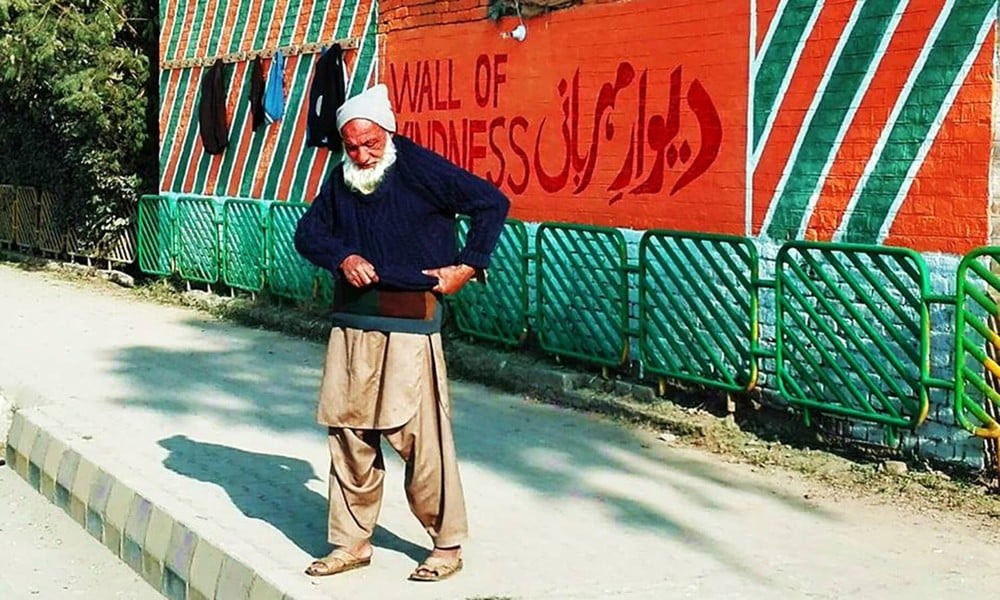
Not just in Peshawar, more people are painting the 'Wall of Kindness' in different cities of the country

A small gesture of helping the needy in Mashad, Iran, was replicated in Peshawar and within a few days "Wall(s) of Kindness" started popping up all over the country.
The purpose of the "Wall of Kindness" or Deewar-e-Mehrbani is simple -- "Leave here whatever you don’t need or take from here whatever you need." A few young people from the city have painted a wall of the government-run tubewell on Phase-III Road in Hayatabad, Peshawar and placed some hooks and hangers on the wall. Passers-by hang warm clothes, jackets, coats, shirts, food or other stuff that they don’t need anymore to be picked up by those who direly need them.
People are visiting the place daily to leave clothes, jackets, coats, shoes, food, and other goods to be used by the needy. Besides, more people have painted walls of their houses, offices, streets or parks. The "Wall(s) of Kindness" now exist in Karachi, Lahore, Quetta, Islamabad, Rawalpindi, Kohat, Bannu, Sahiwal and many other towns.
These walls have been painted in different colours but the purpose is the same; to help the needy before they beg for it. People leave there the extra clothes and shoes, etc, whenever convenient to them and those in need pick them without being noticed.
This huge contribution with a little effort got tremendous response from all over Pakistan. Senior journalist, Amir Mateen, hinted at painting the boundary wall of his house in Islamabad to promote the idea in the federal capital. "This trend borrowed from Iran needs to be encouraged. Please spread the word. I plan to paint my spare wall, you do that too."
"When we saw the video from the Iranian Citizen group that created a wall of kindness, we, the volunteers of Serve Mankind, along with Wadaan painted a similar wall here in Hayatabad," says Asad Ali Lodhi, who along with other friends painted the wall. According to Asad, the concept is simple, if you have extra clothing and food, etc, leave them. If you need clothes or food, take them.
The Wall of Kindness is believed to have been first made in Mashad, Iran. Later, Shiraz, Sirjan and other cities of Iran witnessed the same initiative. A similar wall was also seen in Liuzhuo city of Guangxi, China. Walls of kindness popped up all over Iran and China where labourers and other deserving people are getting clothes and other commodities without begging for it. The idea is now popular in Mongolia too.
Wadaan, the volunteers who painted the wall in Hayatabad, said in one of their Facebook messages that the idea was recommended to them by friends in Iran. "It is a very small step, but it is a good step indeed. We really appreciate the support of the people and this has been possible because of you," said the message. Before Peshawar, two women from Karachi made a similar effort but it couldn’t get attention of the media or social media.
"I see people coming and dropping clothes, food and other stuff and others coming and picking as per their need. A few small steps like this make you feel good about our Peshawar. People here need a little encouragement to do wonders," says a passer-by, Shahid Ali. He believes that the locals should also contribute food and other goods so the poor labourers and other people get the stuff they need for their daily use.
Men, women, and children from the well-off, middle class, and lower middle class families are coming and leaving things for others. One finds clothes and bags (mostly carrying food) hanging on the wall round the clock since January 30, the day the wall was painted.
"I would love to see a wall of kindness in every city and town of Pakistan. It is one of the best initiatives," tweets Suraya Aziz. Social media encouraged and projected the initiative, encouraging people in other cities to paint their spare walls, green, yellow, orange, red, blue or any of these colours and name it Deewar-e-Mehrbani.
The social media helped get a better lifestyle for an elderly labourer, Ghani Baba, from Peshawar whose video, showing him to carry a 100 kg flour bag, went viral and hundreds of people offered to help him in a way that doesn’t harm his self respect.
"Even those projecting themselves by taking their pictures in front of the walls that they painted are doing a good job. If the initiative is helping the needy, there is no harm in projecting those behind the idea in various cities of the country," says Imran Khan, a student. He suggestes there could be more ways to help others.
"We can talk to owners of small restaurants to place a board in their outlets. Anyone interested in feeding one, two or more persons would pay their bill in advance and the owner would place a card for each individual bill on the board to be used by anyone needing food. It could be Rs10 for a cup of tea or bread or a small amount for full meal," Imran explains, adding that there could be several other ways to help those coming to buy medicines, grocery, etc.
Since the idea doesn’t need huge investment or extraordinary effort, many have planned to paint their spare walls as Deewar-e-Mehrbani. The only concern expressed by some people is that in the suburban or rural areas drug addicts may take all the stuff and sell it in the market before the needy take it for their use.
"I have planned to paint wall of my clinic but I was told the idea may not work here," says Dr Shaukat Ali, who runs a clinic in the suburban Peshawar. He was all praise for the initiatives that is helping hundreds of labourers, maids, and other deserving people in the posh areas.